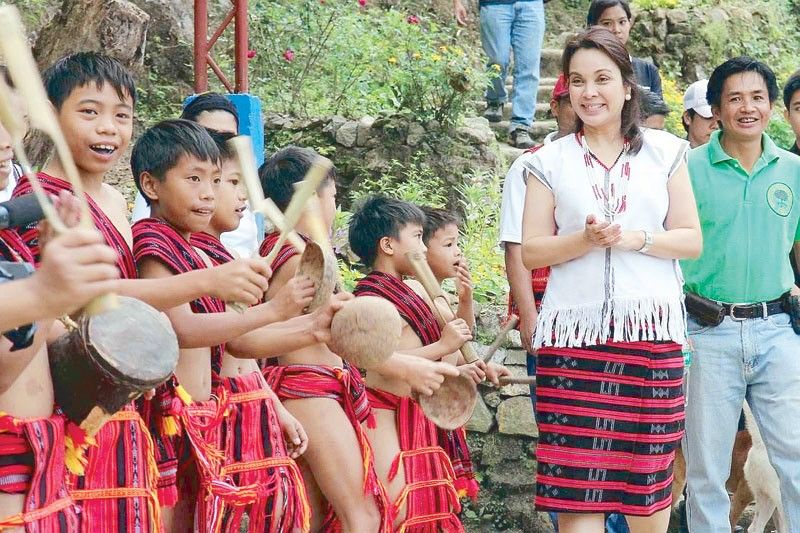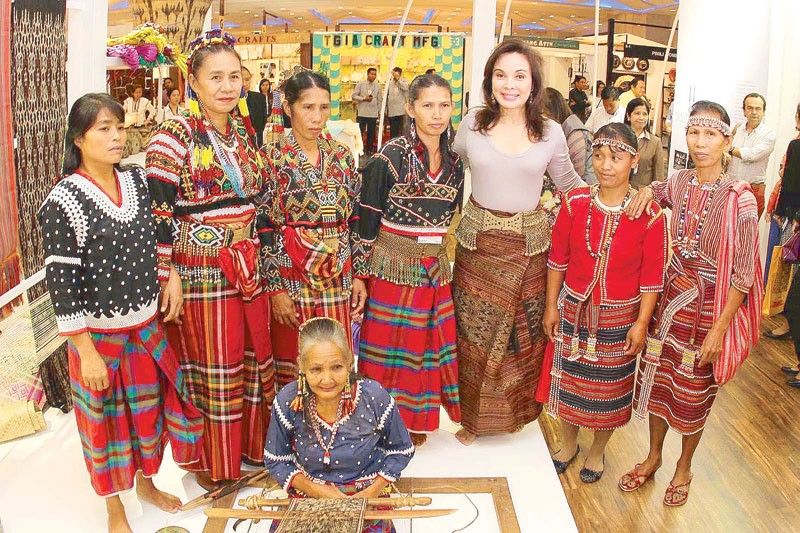Senator Loren Legarda: 'Culture is what binds us as a nation'

Imagine what a typical day would be like for Senator Loren Legarda. It would undoubtedly involve the gods of tasks and a landscape of paperwork — waking up very early, finishing late in the evening, with seemingly infinite toil in between, and then doing it all again the following day. But the people in her circle know how the senator finds the gaps between grueling sessions in the Senate to recharge, de-stress, and reemerge.
“Despite the busy schedule, I always take time to find solace in the beauty of nature,” she says. “I have always been a lover of the environment. I happily tend to my backyard farm and vertical garden, where I plant the vegetables and fruits that I eat.”
For Loren Legarda, it has been a long and gratifying journey to go from being a journalist to becoming a senator, congresswoman, and now Senate President Pro Tempore. But before that, there was this young girl in Potrero, Malabon, who was guided by influential female figures: one sang opera in the bathroom and was the epitome of “class, elegance, intellect, foresight, grounded-ness and compassion,” and another who “carried half of the sky” for the young Loren.
“My late mother, Bessie Gella Bautista, influenced my love for culture. She understood the real value of the handmade, the creative product, and kept colorful, hand-woven textiles protected in a baul or a chest,” remembers the senator.

Nanay Fely, who raised Loren, had tenacity, discipline, loyalty, unconditional love and innate talent. Loren amplifies, “Nanay Fely instilled my love for nature at an early age — observing butterflies and birds, immersing in our gardens and surroundings, and engaging in crafts and activities in nature.”
That young girl would never outgrow her love for nature, culture, and all the things that remind us Filipinos of what we essentially are.
“Culture is what binds us as a nation,” she explains. “Our cultural heritage is what we will pass on to our future generations. But it is in flux because we are confronted with new challenges and the danger of falling to unsustainable life ways. This is why it is essential to define what being a Filipino means comprehensively. We need to build a nation that is fully aware of and proud of its rich and diverse cultural heritage, valuing and understanding the cultures that connected us to our land. In this way we can build true patriotism, take back the good things we lost, and innovate for our current needs in the right direction. When we know where we came from, our strong sense of identity will result in inclusive and lasting progress.”
Senator Legarda has spent most of her life advocating for the protection and preservation of our environment. She has authored the Ecological Solid Waste Management Act, Philippine Clean Air Act, Renewable Energy Act, Wildlife Resources Conservation and Protection Act, National Environmental Awareness and Education Act, Climate Change Act, and Philippine Disaster Risk Reduction and Management Act, among other environmental measures.
Aside from passing key pieces of legislation in relation to art and culture (such as cultural heritage laws, as well as the Act Strengthening the National Museum), she has initiated projects such as Hibla (a pavilion of indigenous textiles and weaves) and Likha-an (a resource center for Philippine living traditions); conceptualized documentaries such as Dayaw (a series on Philippine indigenous peoples and culture); and orchestrated the return of the Philippines to the Venice Biennale (the Olympics for contemporary art and architecture) after a 51-year hiatus, collaborating with the National Commission for Culture and the Arts (NCCA), the Department of Foreign Affairs (DFA), and getting the support of the Department of Tourism (DOT). She has even filed a bill that seeks to institutionalize Philippine participation in the biennale.
The Philippines opened last May 18 its Pavilion with the exhibition titled “Tripa de Gallina: Guts of Estuary” at the 18th International Architecture Exhibition of La Biennale di Venezia. The exhibition, according to Senator Legarda, highlights the critical role of esteros in communities as a “symbol of life, an essential element for human activities and practices, and a catalyst for community development.”
If hard work and sacrifice come, can accolades be far behind?

In February 2016, Senator Legarda was named Chevalier (Knight) dans l’Ordre National de la Le?gion d’Honneur by the Government of France, and in February of this year, she was conferred the award of “Commendatore” to the Order of Merit of the Italian Republic in appreciation of her role in strengthening bilateral relations between the Philippines and Italy.
“As a staunch advocate of promoting Philippine culture and the arts, I have experienced our vibrant, diverse, and meaningful culture. I learned that culture has a fundamental role as the foundation of our nation. I have authored and sponsored several laws for the preservation of our culture, and I learn every day that we can tap into age-old practices to show us the way around our current challenges. Still, we must keep developing our country’s unique culture by enacting more laws to safeguard intangible and tangible cultural heritage.”
A fitting culmination to May, the National Heritage Month, was the passage of the Cultural Mapping Bill (amending Republic Act No. 10066 or the National Cultural Heritage Act of 2009), a measure proposed by Senator Legarda to enhance the preservation of the Philippines’ cultural assets through increased participation and involvement of local government units and communities. This law mandates all local government units to conduct a cultural heritage mapping of their respective areas, covering all tangible and intangible, as well as natural and built heritage.
“Cultural mapping is a systematic way of listing down the cultural assets of a community,” she explains. The lists of cultural assets that are generated from the process will be consolidated so that the data and information can be used for planning, building community strategies, and initiating programs in the realm of arts, culture, education, tourism, and many other aspects of governance.
Culture mapping employs a grassroots approach because the ones who will conduct the cultural mapping are the community members themselves. They can be teachers, community leaders and barangay officials, even students, or just anybody interested to participate in this civic activity.
“Let us remember that the preservation of our cultural heritage is not solely the responsibility of the government or cultural institutions,” she says. “Each of us has a part to play in protecting and promoting our cultural heritage. Whether we are artists, educators, community leaders, or ordinary citizens, we can all contribute to the preservation of our cultural heritage in our own ways. Cultural heritage, after all, is our source of pride and identity as Filipinos.”
NCCA chair Victorino Manalo issued a resolution expressing appreciation and gratitude to the senator for the ratification of the cultural mapping law and for nurturing national identity and creativity through her work in Congress and in the Senate. Manalo writes that the Cultural Mapping Bill wouldn’t have passed in record time if not for the senator’s astute leadership.
Senator Loren would tell you that the work and responsibilities of an elected official may seem fathomless, but the rewards are immeasurable.
“I find strength in seeing lives change because my advocacies made a difference,” she concludes. “When I see laws impact real lives or how extending support can turn dreary situations for the better, all the efforts to fight for my advocacies, all the sacrifices and struggles become worthwhile. The sense of fulfillment is incomparable. Every single advocacy has a story on the ground where a life is made better and a big policy story has impacted so many people.”
These advocacies (interconnected, complementary) form “a tapestry of everything our country needs to meet our challenges.”
And the fabric — threaded with resiliency and perseverance, woven with hard work and inspiration — keeps expanding, becomes all encompassing.



















